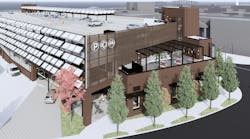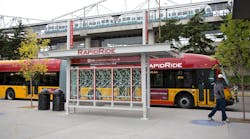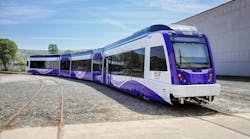One word to describe yourself: Proactive
Alma Mater: Georgia Institute of Technology and George Washington University
Fast fact about yourself: I make a great pound cake.
What’s your best experience on transit and what made it memorable? Each and every time I take the subway in New York City because I don’t have to rely on a car to get to the majority of my destinations and just enjoy being around all the diverse people and cultures that exist in the city.
Ray Biggs, II is the Maryland Department of Transportation Maryland Transit Administration senior project director for the Purple Line. In his role, Biggs provides senior management oversight of engineering, construction and contractual obligations for the 16.2-mile light-rail line that will connect communities from Bethesda and Silver Spring in Montgomery County, Md., to College Park/University of Maryland and New Carrollton in Prince George’s County. The project will bring up 21 stations, with an estimated cost of more than $9.8 billion.
The Purple Line is being delivered via a Public-Private Partnership Agreement (P3 Agreement, an innovative method to achieve the project, expanding transportation between counties while leveraging funding and expertise from the private sector.
Biggs grew up in rural Georgia, ‘small-town America,’ as he describes, without the advantage of easily accessible public transportation. He became fascinated with construction at a young age, laying bricks with his stonemason grandfather at job sites throughout Monroe, Ga., and surrounding counties. His time as a bricklayer taught him the importance of quality craftsmanship and earnest focus on the job at hand.
Constructing thousands of feet of brick structures ignited his interest in construction as a career. Biggs received his civil engineering degree from the Georgia Institute of Technology, graduating with high honors before working five years with the Department of Defense (DOD) as a civil engineer, overseeing the design and construction of complex, multi-million-dollar airfield projects. His time with DOD sparked his commitment to public service, driving his career path to federal and state agency positions of increasing responsibility.
Biggs received his MBA from George Washington University while working on a runway project at Joint Base Andrews. Biggs went on to work for the Federal Transit Administration in several positions within the Office of Program Management and the Office of Planning and Environment. There, he oversaw fixed guideway capital investment projects for the Capital Investment Grant Program, State of Good Repair major capital projects, Transportation Infrastructure Finance and Innovation Act loans and Transportation Investment Generating Economic Recovery projects. He served on the 2020 Biden Campaign Infrastructure Policy Committee, advising on critical infrastructure issues for the then-candidate.
Biggs’ passion and involvement is evident through frequent community meetings, where he fields questions and concerns directly with patience, candor and kindness.
His goal has been to create an inclusive office environment where everyone is encouraged to contribute their opinion, where leaders have an open-door policy and invite creative ideas. He works daily to complete the Purple Line project while building a culture in which milestones are celebrated and teams come together to find solutions to everyday challenges.
What is an accomplishment you would like to work towards in your career?
I want to complete the Purple Line. It’s the largest public-private-partnership for light rail in the country. That’s going to be hard to top but if I’m so lucky, I’d love to eventually manage a comprehensive public infrastructure initiative for the U.S. We need public transportation in so many communities, particularly those that are disconnected from jobs and opportunity. Linking those people and our cultural and economic hubs would genuinely transform lives and make us an ever more equitable country.
Is there a specific experience that led you to where you are today?
As a child, I loved playing with my toy train sets and laying bricks with my grandfather. Those two experiences helped me to appreciate how the built environment shapes every experience we have as human beings and inspired my early interest in engineering. When I went to Georgia Tech, I intended to major in architecture because I always enjoyed art and drawing. There was just more math in civil engineering and as funny as it may seem, I always saw how using math to build was just like using a pencil to draw: both could produce something beautiful. I guess that’s why I love and appreciate both the beauty of the Purple Line vehicles and the technical requirements for them to run smoothly along the tracks.
What do you enjoy most about your job?
I get to work on a project that is literally going to connect communities that, while right next door to one another, the accessibility to get around is not as convenient as one would imagine. This applies to every kind of community, regardless of socio-economic background. I think that’s good for the communities and the expansion of opportunities. We need to be connected if we’re going to get to know and trust one another to build a better future.
I love engaging with all the stakeholders on the project, from every day, concerned citizens, to elected officials, to business owners. Everyone is affected and has a voice and I love getting to hear from people to try to answer their concerns and make them feel the Purple Line is theirs.

Eman Abu-Khaled | Associate Editor
Eman Abu-Khaled is a graduate of Kent State University with a bachelors in journalism. She works through Endeavor Business Media with Mass Transit as an associate editor. Abu-Khaled brings a fresh perspective to the visual side of journalism with an interest in video and photography work.







